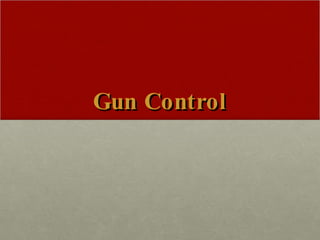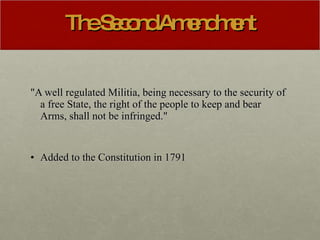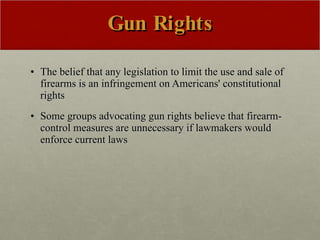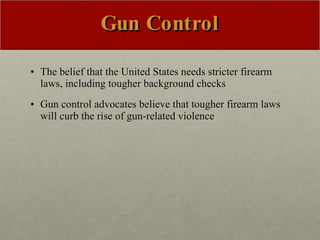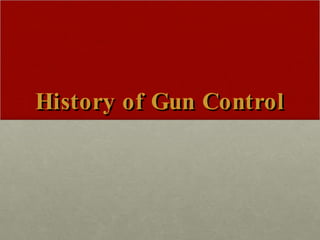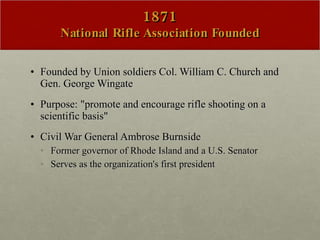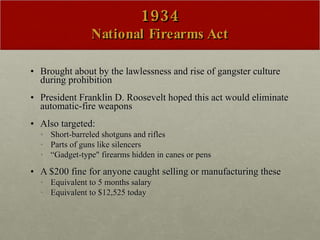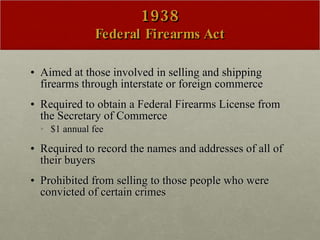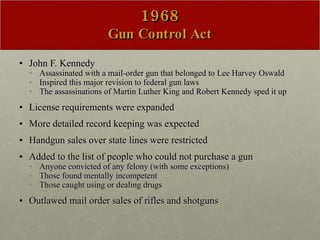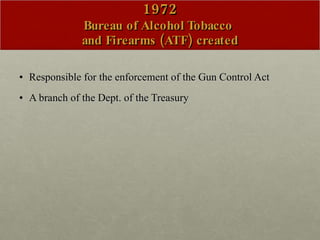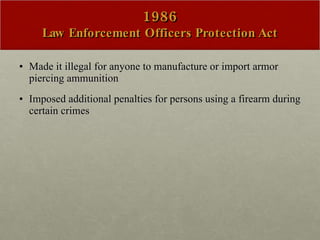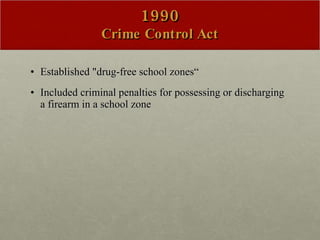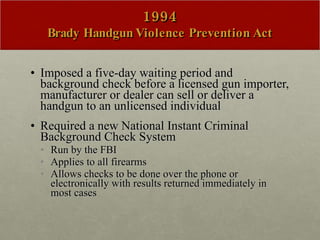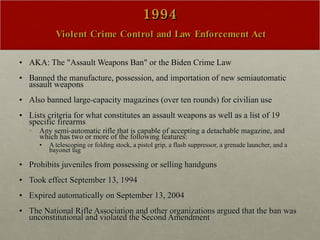Gun control
- 1. Gun Control
- 2. The Second Amendment "A well regulated Militia, being necessary to the security of a free State, the right of the people to keep and bear Arms, shall not be infringed." Added to the Constitution in 1791
- 3. Gun Rights The belief that any legislation to limit the use and sale of firearms is an infringement on Americans' constitutional rights Some groups advocating gun rights believe that firearm-control measures are unnecessary if lawmakers would enforce current laws
- 4. Gun Control The belief that the United States needs stricter firearm laws, including tougher background checks Gun control advocates believe that tougher firearm laws will curb the rise of gun-related violence
- 5. History of Gun Control
- 6. 1871 National Rifle Association Founded Founded by Union soldiers Col. William C. Church and Gen. George Wingate Purpose: "promote and encourage rifle shooting on a scientific basis" Civil War General Ambrose Burnside Former governor of Rhode Island and a U.S. Senator Serves as the organization's first president
- 7. 1934 National Firearms Act Brought about by the lawlessness and rise of gangster culture during prohibition President Franklin D. Roosevelt hoped this act would eliminate automatic-fire weapons Also targeted: Short-barreled shotguns and rifles Parts of guns like silencers ŌĆ£ Gadget-type" firearms hidden in canes or pens A $200 fine for anyone caught selling or manufacturing these Equivalent to 5 months salary Equivalent to $12,525 today
- 8. 1938 Federal Firearms Act Aimed at those involved in selling and shipping firearms through interstate or foreign commerce Required to obtain a Federal Firearms License from the Secretary of Commerce $1 annual fee Required to record the names and addresses of all of their buyers Prohibited from selling to those people who were convicted of certain crimes
- 9. 1968 Gun Control Act John F. Kennedy Assassinated with a mail-order gun that belonged to Lee Harvey Oswald Inspired this major revision to federal gun laws The assassinations of Martin Luther King and Robert Kennedy sped it up License requirements were expanded More detailed record keeping was expected Handgun sales over state lines were restricted Added to the list of people who could not purchase a gun Anyone convicted of any felony (with some exceptions) Those found mentally incompetent Those caught using or dealing drugs Outlawed mail order sales of rifles and shotguns
- 10. 1972 Bureau of Alcohol Tobacco and Firearms (ATF) created Responsible for the enforcement of the Gun Control Act A branch of the Dept. of the Treasury
- 11. 1986 Law Enforcement Officers Protection Act Made it illegal for anyone to manufacture or import armor piercing ammunition Imposed additional penalties for persons using a firearm during certain crimes
- 12. 1990 Crime Control Act Established "drug-free school zonesŌĆ£ Included criminal penalties for possessing or discharging a firearm in a school zone
- 13. 1994 Brady Handgun Violence Prevention Act Imposed a five-day waiting period and background check before a licensed gun importer, manufacturer or dealer can sell or deliver a handgun to an unlicensed individual Required a new National Instant Criminal Background Check System Run by the FBI Applies to all firearms Allows checks to be done over the phone or electronically with results returned immediately in most cases
- 14. 1994 Violent Crime Control and Law Enforcement Act AKA: The "Assault Weapons Ban" or the Biden Crime Law Banned the manufacture, possession, and importation of new semiautomatic assault weapons Also banned large-capacity magazines (over ten rounds) for civilian use Lists criteria for what constitutes an assault weapons as well as a list of 19 specific firearms Any semi-automatic rifle that is capable of accepting a detachable magazine, and which has two or more of the following features: A telescoping or folding stock, a pistol grip, a flash suppressor, a grenade launcher, and a bayonet lug Prohibits juveniles from possessing or selling handguns Took effect September 13, 1994 Expired automatically on September 13, 2004 The National Rifle Association and other organizations argued that the ban was unconstitutional and violated the Second Amendment
